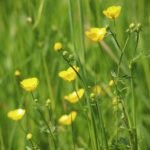Matkustan ympäri maailmaa – Finnish Children’s Song
In this article, we look at an easy children’s song called Matkustan ympäri maailmaa “I travel around the world” or Matkalaulu “Travel song”.
1. Song Lyrics of Matkustan ympäri maailmaa
Below you can find both the Finnish lyrics and the English lyrics. There is a lot of repetition in the lyrics of this song.
| ♬ Finnish song lyrics ♬ | English translation |
|---|---|
| Chorus: Matkustan ympäri maailmaa, laukussa leipää ja piimää vaan Jos mua hiukkasen onnistaa niin uuden ystävän saan. |
Chorus: I’m traveling around the world, in my bag only bread and buttermilk If I’m a little bit lucky then I will get a new friend. |
| Saavunpa keskelle Ranskan maan, laukussa leipää ja piimää vaan. Yksin ei tarvitse ollakaan nyt uuden ystävän saan. Kun sanon PÄIVÄÄ, hän sanoo BONJOUR. |
And so I arrive in the middle of the country of France, in my bag only bread and buttermilk. I don’t have to be alone now I get a new friend. When I say PÄIVÄÄ, He/she says BONJOUR. |
| Chorus: Matkustan ympäri maailmaa, laukussa leipää ja piimää vaan Jos mua hiukkasen onnistaa niin uuden ystävän saan. |
Chorus: I’m traveling around the world, in my bag only bread and buttermilk If I’m a little bit lucky then I will get a new friend. |
| Saavunpa keskelle Japanin maan, laukussa leipää ja piimää vaan. Yksin ei tarvitse ollakaan nyt uuden ystävän saan. Kun sanon PÄIVÄÄ, hän sanoo KONNICHIWA. |
And so I arrive in the middle of the country of Japan, in my bag only bread and buttermilk. I don’t have to be alone now I get a new friend. When I say PÄIVÄÄ, He/she says KONNICHIWA. |
| Chorus: Matkustan ympäri maailmaa, laukussa leipää ja piimää vaan Jos mua hiukkasen onnistaa niin uuden ystävän saan. |
Chorus: I’m traveling around the world, in my bag only bread and buttermilk If I’m a little bit lucky then I will get a new friend. |
| Saavunpa keskelle Venäjän maan, laukussa leipää ja piimää vaan. Yksin ei tarvitse ollakaan nyt uuden ystävän saan. Kun sanon PÄIVÄÄ, hän sanoo TRASTUI (zdravstvuy). |
And so I arrive in the middle of the country of Russia, in my bag only bread and buttermilk. I don’t have to be alone now I get a new friend. When I say PÄIVÄÄ, He/she says TRASTUI (zdravstvuy). |
| Chorus: Matkustan ympäri maailmaa, laukussa leipää ja piimää vaan Jos mua hiukkasen onnistaa niin uuden ystävän saan. |
Chorus: I’m traveling around the world, in my bag only bread and buttermilk If I’m a little bit lucky then I will get a new friend. |
| Saavunpa keskelle Saksan maan, laukussa leipää ja piimää vaan. Yksin ei tarvitse ollakaan nyt uuden ystävän saan. Kun sanon PÄIVÄÄ, hän sanoo GUTEN TAG. |
And so I arrive in the middle of the country of Germany, in my bag only bread and buttermilk. I don’t have to be alone now I get a new friend. When I say PÄIVÄÄ, He/she says GUTEN TAG. |
| Chorus: Matkustan ympäri maailmaa, laukussa leipää ja piimää vaan Jos mua hiukkasen onnistaa niin uuden ystävän saan. |
Chorus: I’m traveling around the world, in my bag only bread and buttermilk If I’m a little bit lucky then I will get a new friend. |
| Saavunpa keskelle Englannin maan, laukussa leipää ja piimää vaan. Yksin ei tarvitse ollakaan nyt uuden ystävän saan. Kun sanon PÄIVÄÄ, hän sanoo HOW DO YOU DO. |
And so I arrive in the middle of the country of England, in my bag only bread and buttermilk. I don’t have to be alone now I get a new friend. When I say PÄIVÄÄ, He/she says HOW DO YOU DO. |
2. Glossary
The following grammar terms have been abbreviated.
- sg1: first person singular
- pl3: third person plural
I have marked different elements of the analysis using the following symbols.
- in italics: base word
- (in brackets): translation
- [in square brackets]: rection
- <symbol: derived from
3. Matkustan ympäri maailma – Lyrics Analyzed
| Matkustan ympäri maailmaa | |
|---|---|
| Matkustan | matkustaa (to travel), sg1 present tense |
| ympäri | around, preposition: [ympäri + partitive] |
| maailmaa | maailma (world), in the partitive case because of ympäri |
| English: I’m traveling around the world | |
The Finnish present tense form “matkustan” can be translated as either “I travel”, “I will travel” or “I’m traveling”. The context of the song tells us that it’s an ongoing process, so I’ve translated it as “I’m traveling”.
The word ympäri can be used both as a preposition and a postposition. In the song, it’s a preposition: it appears in front of maailma. When used as a preposition, we will use the partitive case: [ympäri maailmaa]. In addition, it’s possible to change the word order, thus turning ympäri into a postposition, which requires the genitive case: [maailman ympäri].
| Laukussa leipää ja piimää vaan | |
|---|---|
| laukussa | laukku (bag), inessive case “in the bag” |
| leipää | leipä (bread), partitive case |
| ja | and, conjunction |
| piimää | piimä (buttermilk), partitive case |
| vaan | only, just |
| English: In the/my bag only bread and buttermilk | |
The song doesn’t contain the word minun “my” or the possessive suffix -ni, yet it’s clear that we’re singing about “my bag”. This is fairly common in everyday language situations where the ownership of an object is clear from the context.
Leipä and piimä appear in their partitive form to express an unspecified amount: some bread and buttermilk. These words are both mass nouns.
Piimä is Finnish buttermilk (a sour, thicker dairy product than regular milk), which is a fairly popular drink to have with your lunch. I have no logical explanation for the contents of the bag in the song: why bread and sour milk? No clue! Basic staple foods?
| Jos mua hiukkasen onnistaa | |
|---|---|
| jos | if (conjunction) |
| mua | <minua (spoken language), partitive case because of onnistaa |
| hiukkasen | hiukkanen (slightly), genitive case |
| onnistaa | to luck out, be lucky, rection: [partitive + onnistaa] |
| English: If I luck out a little | |
The verb onnistaa belongs to the same verb category as “minua väsyttää” and “minua kiinnostaa“. The subject of this type of verbs always appears in the partitive case. You might be more familiar with the verb onnistua, which is related, but has a slightly different meaning: “to succeed” (e.g. “Minä onnistun saamaan ystävän” means “I succeed in finding a friend”).
The noun hiukkanen usually means “particle” (as in Higgsin hiukkanen). When used in the genitive case, it’s an adverb that expresses a tiny amount.
| Niin uuden ystävän saan. | |
|---|---|
| niin | then |
| uuden | uusi (new), genitive case because it describes ystävä |
| ystävän | ystävä (friend), genitive case because total object of saada |
| saan | saada (to get, receive), sg1 present tense “I will get” |
| English: Then I will get a new friend. | |
The form minä saan could be translated as “I get”, I’m getting” or “I will get”. In this section, the present tense is used to express a future event. Finnish doesn’t have a future tense.
Objects will appear in the genitive case when they mean “one whole thing”. In the song, you’re getting one new friend, so the genitive is used here: uuden ystävän.
| Saavunpa keskelle Ranskan maan, | |
|---|---|
| Saavunpa | saapua (to arrive), sg1 present tense + clitic -pa, “and so I arrive” |
| keskelle | “in the middle”, mihin form of keskellä, rection: [genitive + keskelle] |
| Ranskan | Ranska (France), genitive case “of France” |
| maan | maa (country, land), genitive case because of keskelle |
| English: And so I arrive in the middle of the country of France | |
The clitic -pa/pä has multiple functions, but in this case it is used to narrate the singer’s own actions: they’re saying out loud what they’re doing.
The postposition keskellä can be used in three forms: the missä-form keskellä “in the middle”, the mistä-form keskeltä “(movement away) from the middle” and the mihin-form keskelle “into the middle”. In the song, the mihin-form is used because of the verb saapua: you’re arriving “into” the middle of France, there’s a movement happening towards the middle.
The song has “Ranskan maan” rather than just “Ranskan” just so each verse of this song would rhyme with the word saan in the previous line (saan > maan). The word maa can be translated here as “country” or “land”.
| Laukussa leipää ja piimää vaan | |
|---|---|
| laukussa | laukku (bag), inessive case “in the bag” |
| leipää | leipä (bread), partitive case |
| ja | and, conjunction |
| piimää | piimä (sour milk), partitive case |
| vaan | only, just |
| English: In the/my bag only bread and piimä | |
This phrase is a repetition of the chorus (see above).
| Yksin ei tarvitse ollakaan | |
|---|---|
| Yksin | alone |
| ei | no, not, “don’t” |
| tarvitse | tarvita (to need), necessity sentence “(I) don’t have to” |
| ollakaan | olla (to be), basic form + suffix -kaan |
| English: I don’t have to be alone after all | |
The personal pronoun “I” isn’t included in this sentence. If we’d add it, it would appear in the genitive case: Minun ei tarvitse ollakaan yksin. This is the negative form of the minun täytyy necessity construction.
The suffix -kaan/kään can express a diverse number of things. In this sentence, it’s used to express that something happens contrary to expectations. It could also express that something happens according to expectations, which just shows how complicated this suffix can be. Read more about –kin and -kaan/kään here.
| nyt uuden ystävän saan. | |
|---|---|
| nyt | now |
| uuden | uusi (new), genitive case because of ystävä |
| ystävän | ystävä (friend), genitive case because total object of saada |
| saan | saada (to get, receive), sg1 present tense “I get” |
| English: Now I get a new friend. | |
The form minä saan could be translated as “I get”, I’m getting” or “I will get”. In this section, the present tense is used to express a current event. It’s happening right now.
Objects will appear in the genitive case when they mean “one whole thing”. In the song, you find one new friend, so the genitive ystävän is used here. In Finnish, adjectives appear in the same form as the noun they’re connected to, so uusi becomes uuden.
| Kun sanon PÄIVÄÄ, hän sanoo BONJOUR. | |
|---|---|
| Kun | when (conjunction) |
| sanon | sanoa (to say), sg1 present tense “I say” |
| päivää | päivä (day) partitive case “good day” |
| hän | he/she |
| sanoo | sanoa (to say), sg3 present tense “he/she says” |
| bonjour | bonjour (French for “good day”) |
| English: When I say PÄIVÄÄ, he/she says BONJOUR | |
“Good day” in Finnish can be either “Hyvää päivää!” or plain “Päivää!”
The Rest of the Song
The rest of the song contains mostly repetition. The chorus (Matkustan ympäri maailmaa, laukussa leipää…) is repeated after every verse. Each verse contains a different country and a corresponding greeting.
- Saavunpa keskelle Japanin maan (“the country of Japan”)
Kun sanon PÄIVÄÄ, hän sanoo KONNICHIWA. - Saavunpa keskelle Venäjän maan (“the country of Russia”)
Kun sanon PÄIVÄÄ, hän sanoo TRASTUI (or zdravstvuy). - Saavunpa keskelle Saksan maan (“the country of Germany”)
Kun sanon PÄIVÄÄ, hän sanoo GUTEN TAG. - Saavunpa keskelle Englannin maan (“the country of England”)
Kun sanon PÄIVÄÄ, hän sanoo HOW DO YOU DO.
So that’s the Finnish song Matkustan ympäri maailmaa! I hope you enjoyed this content. As always, you can comment with song suggestions you’d like me to cover next.





Some corrections:
You wrote the Finnish lyrics only to the first chorus, for all the repetitions they appear in English in both columns (with only the word piimä being in Finnish). Moreover, in the recording that you posted the chorus is sung only twice: at the beginning, and between the 3rd and 4th verse. Also, the two last verses are in reverse order. However, maybe there are different versions of this song.
The Russian greeting is usually transcribed as zdravstvuy, at least to English. Though maybe the transcription from Russian to Finnish is different? And since it’s a children’s song, it could be a simplification.
I think it should be Higgsin hiukkanen instead of hiukkasen (nominative not genitive).
Hey Marcin! 🙂
The recording I picked out is just one version. The verses can have different countries in a different order. New countries can be added as well, which is quite commonly done in international groups of students, where each student’s language can get added. The countries I provided are the most common ones.
Trastui instead of zdravstvuy is indeed a major simplification. I used to spelling provided in online sources of the lyrics of this song. The English chorus was a copy-paste mistake as usual! And “hiukkanen“, yes! Three typo points for you, thank you!